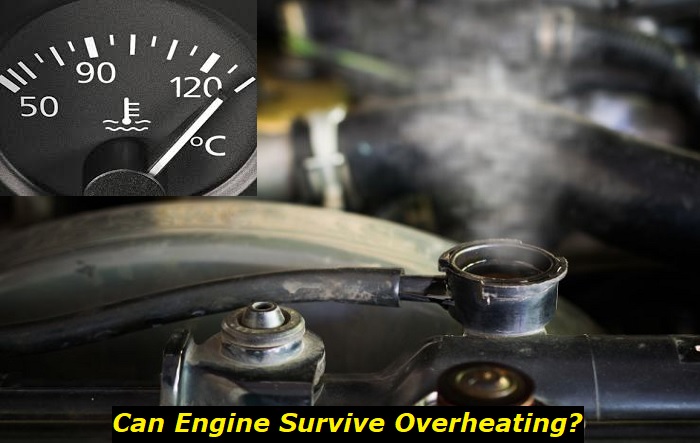If you have a vehicle with an internal combustion engine, you should know that the temperature of this unit is one of the key features that should be considered. Almost all engines have the optimal temperature range within which they work optimally. Once this range is not provided, the engine may be broken or may work inefficiently.
Engine overheating highlights
- Level of urgency:very high
- Commonreasons:low coolant, thermostat problems, coolant blockage, radiator fan problem
- DIY diagnostics:possible but complicated
- DIY repair:impossible
- Price of repair:$300 - $650
- Time for repair:3 - 6 hours
- If ignored:engine failure, low performance, cooling equipment damage

What happens with your engine when it overheats?
Different engines will act differently, in the situation of overheating. Older engines with cast-iron blocks will most likely withstand higher temperatures without fatal problems. But aluminum engines (almost all modern powerplants) are more sensitive to temperatures. Aluminum doesn't have the possibility to expand much - it will crack if the temperature is much higher than expected.
Also, the duration of the overheating session is important. If it's one-two-minutes and the temperature is not that high, your engine is more or less safe. If it's overheated for hours, even slightly higher-than-normal temperatures may cause a lot of problems.
Here is what happens when the engine temperature gets higher than normal:
- metal parts expand because of heat and this makes the engine work harshly;
- the friction between parts becomes too intense and this leads to even worse overheating;
- pistons may start scratching the cylinder walls because they expand and may even change their shape to ovals;
- the engine starts losing oil because of problems with the piston rings;
- the head gasket will not do its job properly - the changed shape of the block and head will make the gasket leak;
- the head may change its shape and start leaking all over the place;
- valves may get stuck because of head shape problems, this will lead to issues with the entire head;
- the crankshaft may go bad because of rod bearing issues or block shape issues;
- any part in the engine may fail immediately and cause it to get stuck;
- the entire engine may fail due to overheating issues and will not be available for repair.
Unfortunately, intensive overheating leads to worse problems with the engine. Also, if the overheating is not that bad but very durable, the consequences may be quite bad. So, this is a very serious condition of the engine if it overheats.
You can see it, first of all, in the engine temperature gauge that is most likely located on your dashboard. If it's not, then you may get the engine temperature light flashing when the situation is bad enough to cause problems. In some cars, you will need to dig in the menu to find the engine temperature and it's certainly worth monitoring it now and then.
Don't let the engine overheat - now you know some of the consequences that may happen with the ICE if it's overheated.
What are the worst consequences of engine overheating?
The worst thing that may happen is complete engine failure. Usually, the engine will be stuck, but sometimes, it may also go mad and rev up like crazy because the oil will be delivered into the combustion chamber and the engine will go craze burning this oil whatever you do. These are very rare events, but they are possible.
Whatever happens, the best thing you can do is to turn off the ignition. If the engine still revs like mad, open the hood and squeeze the air supply hose that connects the air filter plastic box with the throttle. Once you stop the air supply, the engine will stop burning oil or gas.
If the engine is stuck or went mad, it's often not worth repairing it. For a proper repair, you will need to have the head totally inspected and repaired, then the block overhauled, and then buy a lot of new parts that cost a lot and put it all back together. This may take a couple of weeks and it's hard to imagine how much money you will spend on both parts and labor.
What engines can survive overheating?
The good news: not all overheated engines will go bad. For the engine to get all those nasty consequences we were talking about it need to be heated up to impossible temperatures. If it's overheated up to 30% of its normal temperature, you will just need to cool it down and then watch that the temperature gauge needle doesn't go over half of the gauge.
But if the needle spent too much time in the red zone, things are too bad. Though, some engines can even survive this. Most likely, older cast-iron blocks will survive bad overheating. Cast iron is less prone to expanding when heated, so it's a more reliable material for engine blocks. But aluminum is lighter, so all manufacturers now prefer this option.
Also, smaller engines are less likely to survive bad overheating. We've seen hundreds of cases when Ford's 1.0 EcoBoost overheated and died immediately. While killing a 5.8L V8 engine with overheating is not a simple task.
So, bigger engines with cast-iron blocks are more likely to survive overheating. While smaller aluminum engines are more prone to problems when their temperature goes up.
How to prevent overheating in your engine?
Now you know that allowing your engine to overheat is not something you want to do. To make sure your vehicle is safe and has a very low chance of engine overheating, you will need to follow these steps:
- regularly check the level of coolant in the reservoir under the hood of your vehicle;
- check the quality of coolant once every two or three years to make sure it's still OK;
- have the coolant replaced once every 5-7 years or 60,000 miles to make sure it's OK;
- replace the water pump every time you replace the timing belt or chain in the engine;
- don't rev up the engine for too long, drive with optimal RPM;
- make sure the engine heats up as it always does (the same time, the same temperature level in the end);
- watch the temperature gauge and never ignore any error messages that tell you about engine temperature;
- have the vehicle inspected every year or at least once 15,000 miles - when you do the regular maintenance.
Once you notice that the engine in your vehicle overheats, you need to understand why. Once you locate the problems, immediately have the vehicle repaired. Driving with an overheated engine is not safe at all. It may get stuck any minute. But it's not always necessary to call a tow truck if you get into such a situation. Read further to learn what you should do when the engine temperature goes too high.
What to do when the engine overheats?
If you already hear some bad sounds from your engine or notice it lost some power, better turn it off immediately and don't start the engine until the professional looks at it. But if the engine is completely OK and just the gauge shows you that the temperature is too high, you may use this trick:
- find a safe place, park your car, and turn off the engine;
- open the hood to let the engine cool down faster;
- wait 20-30 minutes till it cools down (the time depends on the temperature outside);
- start the engine and drive till you see that the temperature gauge needle is well over half of the gauge;
- stop the vehicle again and let it cool down;
- repeat it till you reach your destination.
Of course, it's better to make the dealership or repair shop your first destination, in this case.
In this article, we haven't spoken about the primary reasons for overheating. This is the topic for another full article, so we'll not take more of your time, we'll just list these reasons here to give you an idea of what may have happened:
- the thermostat is stuck closed;
- low coolant level;
- the water pump is not working;
- bad coolant quality;
- the radiator is clogged;
- the radiator fan is not working;
- problems with the flow of coolant;
- engine problems;
- no oil in the engine.
This is just the list of the problems that may most commonly lead to overheating. It doesn't mean that the list is completed and can't be expanded. The eventual reason for overheating in your case, the mechanic will find after a thorough inspection. Without this, it's hard to tell what exactly happened. But you may check the coolant level, the color of the coolant, the temperature of the radiators, etc. to check the primary possible reasons.
About the authors
The CarAraC research team is composed of seasoned auto mechanics and automotive industry professionals, including individuals with advanced degrees and certifications in their field. Our team members boast prestigious credentials, reflecting their extensive knowledge and skills. These qualifications include: IMI: Institute of the Motor Industry, ASE-Certified Master Automobile Technicians; Coventry University, Graduate of MA in Automotive Journalism; Politecnico di Torino, Italy, MS Automotive Engineering; Ss. Cyril and Methodius University in Skopje, Mechanical University in Skopje; TOC Automotive College; DHA Suffa University, Department of Mechanical Engineering






Add comment